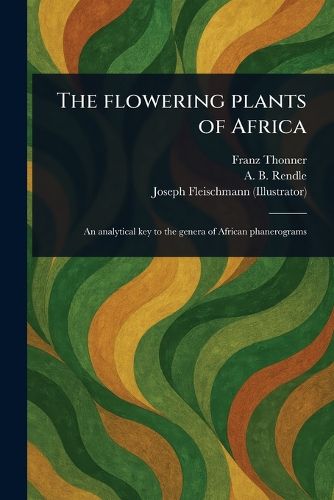Readings Newsletter
Become a Readings Member to make your shopping experience even easier.
Sign in or sign up for free!
You’re not far away from qualifying for FREE standard shipping within Australia
You’ve qualified for FREE standard shipping within Australia
The cart is loading…






This title is printed to order. This book may have been self-published. If so, we cannot guarantee the quality of the content. In the main most books will have gone through the editing process however some may not. We therefore suggest that you be aware of this before ordering this book. If in doubt check either the author or publisher’s details as we are unable to accept any returns unless they are faulty. Please contact us if you have any questions.
"The Flowering Plants of Africa: An Analytical Key to the Genera of African Phanerograms" by Franz Thonner is a comprehensive guide to the angiosperms, or flowering plants, of Africa. This meticulously prepared edition provides an essential resource for anyone interested in African botany and plant identification.
A key to the genera of African phanerograms, this book offers a systematic approach to understanding the rich flora of the continent. Its detailed organization and analytical structure make it a valuable tool for both amateur enthusiasts and seasoned botanists. Explore the diverse world of African plants through Thonner's insightful work, a cornerstone in the study of angiosperms in Africa. Discover the history and enduring significance of this classic botanical text.
This work has been selected by scholars as being culturally important, and is part of the knowledge base of civilization as we know it.
This work is in the public domain in the United States of America, and possibly other nations. Within the United States, you may freely copy and distribute this work, as no entity (individual or corporate) has a copyright on the body of the work.
Scholars believe, and we concur, that this work is important enough to be preserved, reproduced, and made generally available to the public. We appreciate your support of the preservation process, and thank you for being an important part of keeping this knowledge alive and relevant.
$9.00 standard shipping within Australia
FREE standard shipping within Australia for orders over $100.00
Express & International shipping calculated at checkout
This title is printed to order. This book may have been self-published. If so, we cannot guarantee the quality of the content. In the main most books will have gone through the editing process however some may not. We therefore suggest that you be aware of this before ordering this book. If in doubt check either the author or publisher’s details as we are unable to accept any returns unless they are faulty. Please contact us if you have any questions.
"The Flowering Plants of Africa: An Analytical Key to the Genera of African Phanerograms" by Franz Thonner is a comprehensive guide to the angiosperms, or flowering plants, of Africa. This meticulously prepared edition provides an essential resource for anyone interested in African botany and plant identification.
A key to the genera of African phanerograms, this book offers a systematic approach to understanding the rich flora of the continent. Its detailed organization and analytical structure make it a valuable tool for both amateur enthusiasts and seasoned botanists. Explore the diverse world of African plants through Thonner's insightful work, a cornerstone in the study of angiosperms in Africa. Discover the history and enduring significance of this classic botanical text.
This work has been selected by scholars as being culturally important, and is part of the knowledge base of civilization as we know it.
This work is in the public domain in the United States of America, and possibly other nations. Within the United States, you may freely copy and distribute this work, as no entity (individual or corporate) has a copyright on the body of the work.
Scholars believe, and we concur, that this work is important enough to be preserved, reproduced, and made generally available to the public. We appreciate your support of the preservation process, and thank you for being an important part of keeping this knowledge alive and relevant.